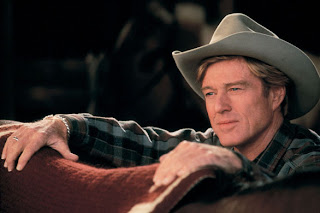Wise: Hi, Werth!
Werth: Are you excited for the old classic that's returning to movie theaters this weekend?
Wise: Are you referring to The Evil Dead?
Werth: Yes... and Robert Redford's in a new movie too.
Wise: Oh, The Company You Keep, Redford's latest directorial effort where he plays a former sixties radical with a new identity who goes on the run when reporter Shia Labeouf begins sniffing around his past.
Werth: Redford's been pretty picky about what film projects he'll do of late. His last trip to the big screen was 2005's stinker Lions for Lambs.
Wise: He also kept himself busy off-screen directing a film about the assassination of Lincoln.
Werth: One of Redford's films was assassinated in 1974. Directed by Jack Clayton and adapted by Francis Ford Coppola, the third film version of F. Scoot Fitzgerald's Jazz Age bible The Great Gatsby stars Redford as wealthy entrepreneur/con man Jay Gatsby and Mia Farrow as his long-lost love Daisy Buchanan. Going over the plot feels silly, since I know everyone had to read the book in high school, so instead I'll gab about how the film is as disappointing as a glass of bad bathtub gin.
Wise: There's no such thing as bad bathtub gin, just bad mixer.
Werth: I'm going to Charleston around the great books vs. movies debate by saying movies based on iconic literature can be successful if they either nail the visuals that the book evokes or re-imagine them. Gatsby does neither of these things.
The parties and the people in Fitzgerald's novel are so vivid, that it's shocking to see that cinematographer Douglas Slocombe shot everything with a bland, fuzzy wash that makes the entire picture look like a Seventies Olan Mills family portrait. Perhaps Slocombe was going for the idea that Fitzgerald's world was dreamlike, but what he winds-up with is a film that lacks visual depth.
The party scenes shot on the finest lawns of Newport, Rhode Island, in particular, lack color and energy and evoke forced fun rather than a decade that is burning itself up with the ecstasy of champagne and short skirts.
Floating about in designs by Ralph Lauren and Oscar-winner Theoni V. Aldredge, Redford and Farrow use their best assets to bring Gatsby and Daisy to life, but their screen personae get in the way of fully realizing Fitzgerald's doomed lovers. Farrow captures the child-like, dreamy quality of Daisy, but she doesn't bring the necessary mercenary flapper mentality to the screen.
Redford looks the part of an unbelievably handsome man searching for something he lost, but Redford's frank, earthy qualities that made him a superstar in the late Sixties and Seventies clash with the calculating, dishonest enigma that is supposed to be Gatsby.
Wise: Gatsby's no Sundance Kid.
Werth: The film does have some bright spots. Lois Chiles as Jordan Baker is sultry and sensuous, like a frosty temptress who might melt you, but never herself. And Karen Black is perfect as Myrtle Wilson, her imperfect beauty and innate cheapness making this gas station mistress as tragic a figure as she should be.
Clayton gets the visuals right for the Valley of Ashes and the eyes of Dr. T.J. Eckelberg, capturing elements of the fantastic that exist in the minds of Fitzgerald's readers. But the green light at the end of Daisy's dock isn't bright enough to make this film the definitive depiction of The Great Gatsby. We'll see how Baz Luhrmann does with it.
Wise: Redford had better luck directing and playing the title role in The Horse Whisperer (1998). As Tom Booker, a strong, silent type with a penchant for healing traumatized equines, he's called upon by Annie MacLean (Kristin Scott Thomas), a New York editor who believes that his methods are the only chance her daughter Grace (a young Scarlett Johansson) has to recover from a serious riding accident.
Annie and Grace move to Montana with Grace's troubled horse Pilgrim and embark on a journey of self-discovery. Along the way and with Annie's help, Tom begins to address his own past traumas .
Werth: Did he not get the pony he always wanted when he was a little boy?
Wise: The film never quite finds the correct balance between Tom's cowboy stoicism and the more emotional drama of Annie and Grace. Still, there are some great performances, particularly by Redford who epitomizes male tortured beauty.
Kristin Scott Tomas is fantastic in whatever she does, although she's hampered here by an unfortunate, although period appropriate haircut, that in retrospect makes her look less like hard-edged career woman and more like a Wilson Phillips superfan.
Werth: Hold on for one more day, Kristin.
Wise: Chris Cooper and Dianne Wiest have small, yet pivotal roles in the film as part of Tom's extended family. Scarlett Johansson doesn't have much to do besides look sullen and haunted which she does adequately, but whenever the script calls for more emotion, she begins to perform something more like a Theda Bara impersonator, although without the subtlety.
The main reasons to see the film are Redford and Scott Thomas's performances, plus the gorgeous cinematography by Robert Richardson who captures both the harsh angularity of New York as well as the gorgeous yet forbidding Montana landscape. The Horse Whisperer isn't one of Redford's best, but it does have an addictive quality to it that makes it a familiar pleasure to return to.
Werth: Kind of like returning each week for a brand new Film Gab.
Wise: Wild horses couldn't keep me away, although too much Scarlett Johanssen might.
































